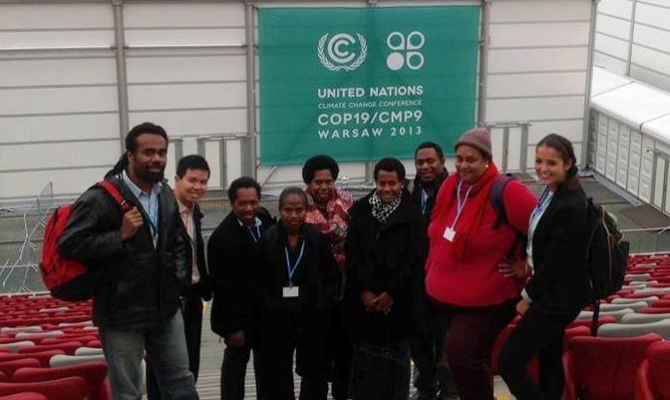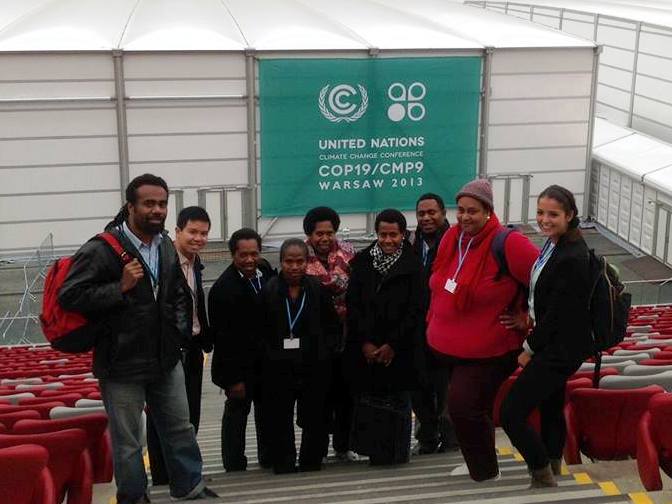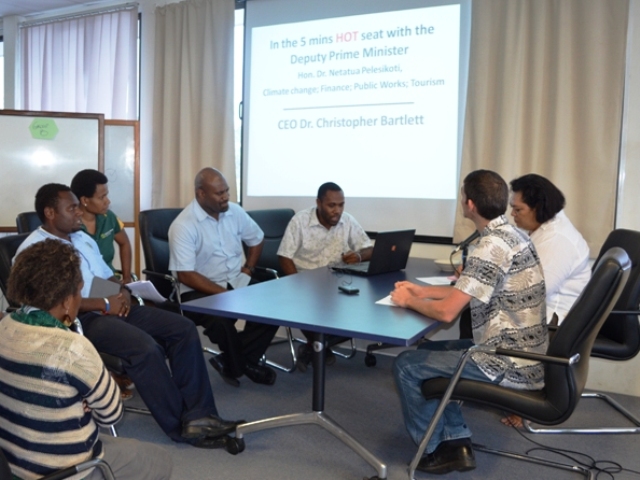
Climate Change Resilience
11 November 2013, UNFCCC COP 19, Warsaw Poland - Vanuatu is serious about raising their climate change concerns at the international level.
The island nation has a 15 strong delegation including a cabinet minister at the 19th Conference of the Parties to the United Nations Framework Convention to Climate Change (UNFCCC COP19), all of whom were part of a six month project to prepare for the global negotiations.
As part of this project delegates were selected to represent Vanuatu and participate in a range of different activities to develop national positions, prepare ministerial cabinet briefings, undergo negotiations training and a workshop to assign different roles and responsibilities within the delegation.
"Our delegation is wide and varied, we have members from the government, civil society, youth groups and private sector," said Mr. Albert Williams of Vanuatu.
"We prepared our delegation to be well informed of our key issues of finance, gender balance, adaptation and so forth, before coming here. The COP is tough and that's why we wanted them to have a feel of the realities of this event before coming to Warsaw so our delegation is better prepared."
 Members of the Vanuatu delegation in Warsaw, Poland
Members of the Vanuatu delegation in Warsaw, Poland
Photo courtesy of Climate Change Vanuatu
Vanuatu were one of the first nations in the world to relocate a community due to climate change impacts. The Tegua relocation programme began in 2002 and resulted in 100 residents moving inland due to coastal inundation impacting on their homes and drinking water.
The climate change impacts continue to be felt by the residents of Vanuatu with water shortages, coastal inundation and erosion of coastlines, relocation of government infrastructure and effects on food crops.
For Vanuatu the global climate change negotiations are vital to the survival of their way of life and investing in a well-prepared national delegation demonstrates their commitment.
"I think we achieved so much in such a short time with our six month preparation project," said Charlotte-Fleur Cristofari, coordinator of the project that is led by the Vanuatu National Advisory Board on Climate Change - Project Management Unit.
"We've made history for Vanuatu on different levels: we made our first two submissions to the UNFCCC on Gender Balance and Direct Finance; this is our largest delegation ever with over 15 members, including a large female contingent, which is a first too."
As part of preparation for the Vanuatu delegation, they underwent a one week negotiations skills training by the Secretariat of the Pacific Regional Environment Programme (SPREP), helping to provide first time delegates with a background view of what to expect at the climate negotiations.
 Role playing activities during the training which requires teams to develop ministerial briefs on agenda items
Role playing activities during the training which requires teams to develop ministerial briefs on agenda items
It was through this project that other sectors were also provided the opportunity to strengthen their awareness and understanding about the UNFCCC COP. A seminar was made to students at the Emalus Campus of the University of the South Pacific; a national youth and climate change day was held across the 6 provinces of Vanuatu and; national media also underwent a one day training facilitated by SPREP.
The pilot project is funded by AusAid, through Oxfam and SPC-GIZ Climate Change Vanuatu. It is supported by the National Advisory Board on Climate Change- Project Management Unit, Vanuatu Climate Adaptation Network (VCAN), SPREP, Melanesian Spearhead Group (MSG), USP and Vanuatu Broadcasting and Television Corporation.
The UNFCCC COP 19 is hosted in Warsaw, Poland from 11 to 22 November.
The island nation has a 15 strong delegation including a cabinet minister at the 19th Conference of the Parties to the United Nations Framework Convention to Climate Change (UNFCCC COP19), all of whom were part of a six month project to prepare for the global negotiations.
As part of this project delegates were selected to represent Vanuatu and participate in a range of different activities to develop national positions, prepare ministerial cabinet briefings, undergo negotiations training and a workshop to assign different roles and responsibilities within the delegation.
"Our delegation is wide and varied, we have members from the government, civil society, youth groups and private sector," said Mr. Albert Williams of Vanuatu.
"We prepared our delegation to be well informed of our key issues of finance, gender balance, adaptation and so forth, before coming here. The COP is tough and that's why we wanted them to have a feel of the realities of this event before coming to Warsaw so our delegation is better prepared."

Photo courtesy of Climate Change Vanuatu
Vanuatu were one of the first nations in the world to relocate a community due to climate change impacts. The Tegua relocation programme began in 2002 and resulted in 100 residents moving inland due to coastal inundation impacting on their homes and drinking water.
The climate change impacts continue to be felt by the residents of Vanuatu with water shortages, coastal inundation and erosion of coastlines, relocation of government infrastructure and effects on food crops.
For Vanuatu the global climate change negotiations are vital to the survival of their way of life and investing in a well-prepared national delegation demonstrates their commitment.
"I think we achieved so much in such a short time with our six month preparation project," said Charlotte-Fleur Cristofari, coordinator of the project that is led by the Vanuatu National Advisory Board on Climate Change - Project Management Unit.
"We've made history for Vanuatu on different levels: we made our first two submissions to the UNFCCC on Gender Balance and Direct Finance; this is our largest delegation ever with over 15 members, including a large female contingent, which is a first too."
As part of preparation for the Vanuatu delegation, they underwent a one week negotiations skills training by the Secretariat of the Pacific Regional Environment Programme (SPREP), helping to provide first time delegates with a background view of what to expect at the climate negotiations.

It was through this project that other sectors were also provided the opportunity to strengthen their awareness and understanding about the UNFCCC COP. A seminar was made to students at the Emalus Campus of the University of the South Pacific; a national youth and climate change day was held across the 6 provinces of Vanuatu and; national media also underwent a one day training facilitated by SPREP.
The pilot project is funded by AusAid, through Oxfam and SPC-GIZ Climate Change Vanuatu. It is supported by the National Advisory Board on Climate Change- Project Management Unit, Vanuatu Climate Adaptation Network (VCAN), SPREP, Melanesian Spearhead Group (MSG), USP and Vanuatu Broadcasting and Television Corporation.
The UNFCCC COP 19 is hosted in Warsaw, Poland from 11 to 22 November.